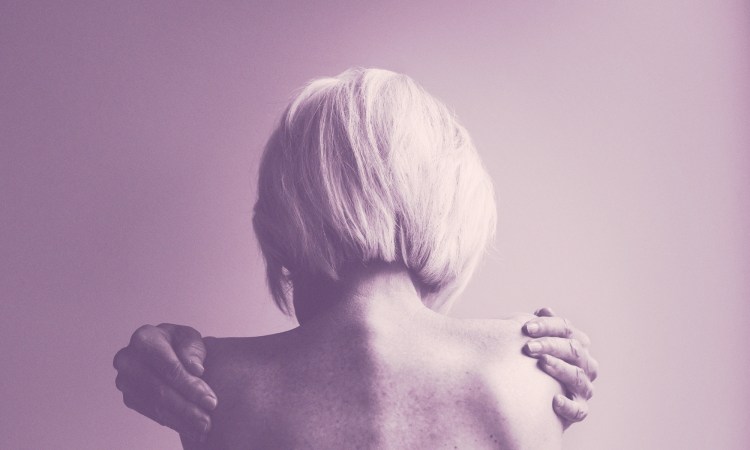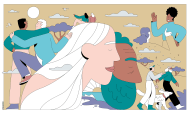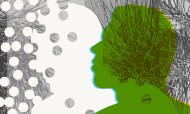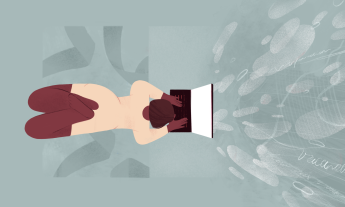
Dr. Jen Gunter is ready to bust the lies you’ve been told about your health, debunking the stickiest myths out there while helping you understand how your body really works. Listen to her new TED Audio Collective podcast, Body Stuff with Dr. Jen Gunter, on Apple Podcasts, and read on for this exclusive excerpt from her new book to learn the truth about menopause.
If menopause were on Yelp, it would have one star.
I could imagine reviews like:
This establishment has temperature control issues. Drenching heat followed by terrible chills. Defies the laws of thermodynamics. Would not recommend.
Awful, awful, awful! Bleeding was scheduled, but was rebooked without notification so arrived 3 weeks later than expected while I was in an Uber and I flooded the car.
The sex was dry.
Menopause is like being sent on a canoe trip with no guidebook and only a vague idea where you are headed — although the expectation is it will be awful. There will be no advice on how to get there or how to manage any of the obstacles, such as rapids.
Fear? Check. Uncertainty? Check. Medical ramifications? Check. Unpleasant symptoms? Check. Societal irrelevance? Check.
The culture of silence about menopause in our patriarchal society leaves women uninformed. What little that is spoken about menopause is often viewed through the lens of ovarian failure — the assertion that menopause is a disease that exists because women and their ovaries are weak.
The only grounds for this claim are that men don’t experience menopause. But comparing women and men in this way is the same as comparing the liver with the heart. The liver isn’t weak or diseased because it doesn’t beat like the heart, and women aren’t diseased because the ovaries stop making estrogen. Consequently, many women suffer with symptoms or don’t receive important health screenings or therapies and they’re dismissed with platitudes like “This is just part of being a woman” or “It’s not that bad.”
Women have their symptoms and health concerns related to menopause dismissed as being fabricated, unimportant or just “part of being a woman”.
Most women will spend one-third or even one-half of their lives postmenopausal, and if you include the menopause transition, then it’s definitely one-half. Currently there are 64 million women in the US who are 50 years or older, and worldwide that number is over one billion. As the population is aging because of lower birth rates, the percentage of women in the menopause transition or who are postmenopausal is only going to increase.
Despite the universal nature of menopause, many women aren’t well informed about the symptoms, the physical changes, the medical concerns or their treatment options. This information vacuum has been created by a toxic combination of medical providers being unable to meet the educational needs of their patients (medicine has some serious communication issues) and medical misogyny, meaning medicine’s long history of neglecting women. Consequently, women have their symptoms and health concerns related to menopause dismissed as being fabricated, unimportant or just “part of being a woman” — meaning something to endure.
But the societal shame extends beyond the provider’s office. There is the general disdain for women as they age. Maybe disdain isn’t the right word since the concerns of women as they age are often so unimportant that they aren’t even worth that minimal effort… they’re simply ignored.
Menopause deserves at least the same attention as puberty, and menopause is no more a disease than being a man is a disease.
Medically speaking, menopause is puberty in reverse, a transition from one biological phase of ovarian function to another. But the way we view these two events couldn’t be more different. So let’s set the record straight. Menopause deserves at least the same attention as puberty — I’d argue even more — and menopause is no more a disease than being a man is a disease.
As a teen, I read books where the character had her period or what wrestling with bras, there were a few cool moms in my group of friends who were willing to talk with us about menstrual products, and my friends and I talked about periods among each other. It was exciting. I wasn’t exactly sure why, but I was aware it was a marker of my relevance in society.
In contrast, there are no coming-of-age stories for women in menopause and the rare times when menopause is alluded to it seems ubiquitously negative. What’s more, the unfortunate silence about menopause and the gaps in knowledge are exploited by both the pharmaceutical industry and those who sell supplements and other so-called natural products.
But the issues with menopause go beyond the medical neglect and these knowledge gaps. Women tell me that menopause is lonely; there are no stories or culture for them to learn from. So there is no whisper network to take up the slack from medicine, nothing to offer comfort.
What I hear constantly from women is: “What do I do?” and “Where do I turn?”
This is because women are desperate to know more about menopause so they can understand how and why their body is changing and they want information so they can make decisions that work for them.
I contrast these experiences with my own. Having started medical school when I was 20 years old and my ob/gyn training when I was 24, I can’t remember back to a time when I didn’t have a detailed understanding of the hormonal changes of both the menstrual cycle and menopause — and not just the biology, but how to apply it practically to my own body.
Many women have mild menopause symptoms, some moderate and others severe.
My medical knowledge didn’t prevent me from having menopause acne, hot flushes or those “special” heavy periods that are all typical of the menopause transition. But because I knew exactly what was happening and when to seek care, it made the whole process feel routine. Because I knew the tests that were indicated and those that were not and because I understood the therapies, it was much easier for me to navigate the treatment options and chose the safety options and avoid the snake oil.
By the time I entered my own menopause transition I had spent over 20 years speaking with women about their menopause and helping them manage their symptoms and any health concerns, so I had knowledge of the range of experiences and well as the treatment options.
Women often only hear the awful stories about menopause, but the truth is the menopause experience is a vast diaspora. Many women have mild symptoms, some moderate and others severe. Often these symptoms are temporary, but occasionally they’re long lasting.
Menopause does start a series of biological events that increases a woman’s risk of several medical conditions, such as cardiovascular disease and osteoporosis. But menopause isn’t the only paint on a woman’s canvas. Age, other medical conditions, diet, exercise and adverse childhood events are also adding color to her portrait. So when a woman wants to consider what she should do, it’s important to step back and look at the whole picture. Managing menopause is the ultimate exercise in holistic, or whole body, medicine.
Because menopause occurs while a woman is aging, it’s equally important not to brush off every symptom as hormone-related.
Menopause is not a disease. It is an evolutionary adaptation that is part of the survival of the species, like menstrual periods or the ability to suppress the immune system during pregnancy so the body doesn’t attack the fetus like a poorly matched transplanted organ. Like these other biological phenomena, menopause is associated with downsides — bothersome symptoms for some women and an increased risk of several medical conditions.
But menopause also occurs while a woman is aging, so it’s equally important not to brush off every symptom as hormone-related. It’s important that women know about menopause but everything that is menopause adjacent, so they can understand what is happening to their own bodies and advocate for care when indicated.
My manifesto is for every woman to have the knowledge to help them with their own menopause. I demand that the era of silence and shame about menopause yield to facts and feminism. I proclaim that we must stop viewing menopause as a disease, because that means being a woman is a disease and I reject that shoddily constructed hypothesis. I also declare that what the patriarchy thinks of menopause is irrelevant. Men do not get to define the value of women at any age.
It seems there is no greater act of feminism than speaking up about a menopausal body in a patriarchal society.
If you are years away from menopause, you can learn about the road ahead and view menopause as a phase of life and get informed of the preventative care that can be taken to lessen its impact on your health. If you are already on Team Menopause, you can still take time to understand how you got here biologically speaking and what health considerations may still lie ahead. It’s never too late for preventative health care.
And if you are going through your menopause transition and experiencing the hormonal chaos, know this is the rockiest phase for many women. Often just that acknowledgement can help. If you are suffering, know there are explanations for how and what you are feeling, as well as therapies — and the rapids won’t last forever.
It shouldn’t require an act of feminism to know how your body works, but it does. And it seems there is no greater act of feminism than speaking up about a menopausal body in a patriarchal society.
So let’s make some noise — about what we’re going through, about what the science knows and what needs to be researched, and about what still needs to change.
Adapted from the new book The Menopause Manifesto: Own Your Health With Facts and Feminism by Dr. Jen Gunter, reprinted with permission from Kensington Books. Copyright © 2021 Dr. Jen Gunter.
Watch her TED Talk here now, and don’t forget to check out her TED Audio Collective podcast, Body Stuff with Dr. Jen Gunter:












